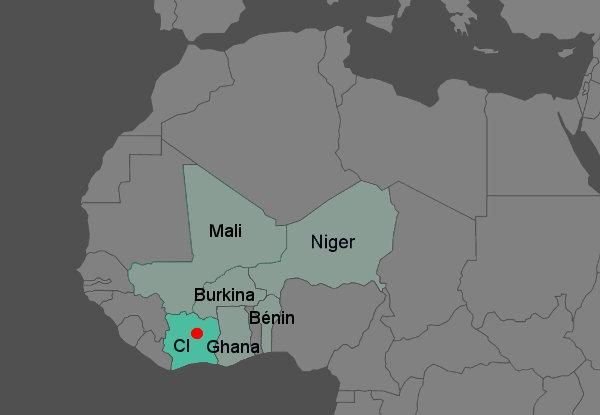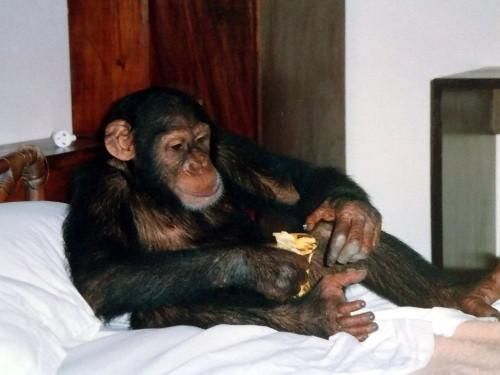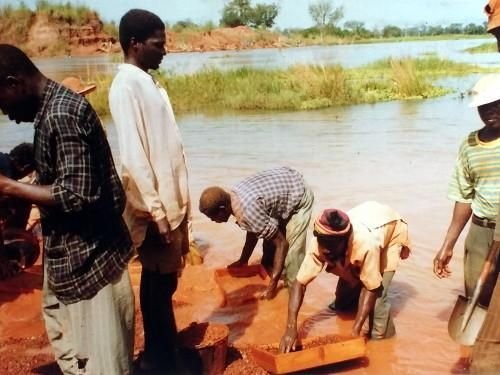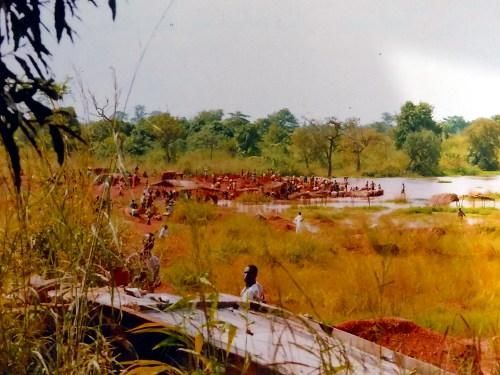Encounters with Africa: The Diamond Rush, by @terresco (translated from French)
This is an authorized translation in English of a post in French by @terresco: Rencontres avec l'Afrique : La ruée aux diamants
As my primary language is not English, there are probably some mistakes in my translation.
Remember that the person who speaks here is NOT me, Vincent Celier (@vcelier), but @terresco, a French guy.

I do not know when or how, one day, someone found diamonds in this region of northern Ivory Coast. These mines, exploited for a time, gave birth to a village called Tortiya. The company went bankrupt giving way to a clandestine artisanal exploitation. A deposit rich enough to convert the quiet village, located on the banks of the river Bou, in a little Ivorian far west. The village had lost its tranquility and its landscape was transformed into gruyère. Getting there was not really difficult but it was necessary to follow a long track that kept it protected from the curious.
The place had attracted adventurers, mostly foreigners from neighboring countries: Liberia, Burkina Faso or Guinea. The area had a somewhat sulfurous reputation that can easily be imagined. One of these adventurers was European; born in Central Africa he had arrived there a little by chance, at the right time, and had done some business. The search for the diamond was always more dangerous and random, but having taken a wife in the area, he decided to set up a small camp on the river.
The camp of Marius
It was simple but welcoming. Some rooms and a large shaded round table where meals were taken together. The camp was frequented by the rare tourists, often expatriates living in Abidjan, as well as by buyers of diamonds. That gave it an entertaining character, allowing to meet different people. They mastered the diamond industry and a few beers and flatteries quickly brought them to confidences. They opened the doors to visits of the most instructive, to penetrate this clandestine environment so closed.
The owner had recovered two young chimpanzees who had become adults. One of them had died recently but the other was free to go everywhere in the camp. And basicly he was busy teasing the visitors. At first it was very funny but quickly it became quite annoying. I can nothelp but tell some of the animal's prowess.

A little later I sat on an outside couch to read the newspaper. The Ivorian press in a few ways not to miss under any circumstances. Ivoir'Soir was part of it. We were in the middle of a rebound story about a likely sex thief who scared people and hit the headlines. I open my newspaper in search of the latest items on the case when the monkey comes to sit next. A hand suddenly grabbed the newspaper, leaving me no time to react, and my new friend was already holding the paper in the same way as me, imitating me comically and leaving me without news.
In the morning the chimpanzee was having breakfast with everyone. Sitting beside his master, he was first put a large white towel around his neck. He was given a bowl of milk and chocolate powder, which he stirred with a certain presence. A slice of bread was made for him that he dipped in the milk before tasting it. It was a pure pleasure to see him do it.
The mines of Tortiya

The work underground was one of the components, it was then necessary to remove the soil and look for the precious stones, never very big. If by chance someone discovered a diamond larger than average, it was necessary to keep the secret under penalty of being a victim. In the evening, the finds were brought to the buyers who weighed and paid in cash the price that suited them. Needless to say, there was no correlation between the difficulty or the dangerousness of work and the remuneration. Those who got rich were the buyers. Once a week they went to resell to their contacts in Abidjan who themselves had other contacts in Holland, sometimes in South Africa.

In spite of everything, the most dangerous thing in Tortiya was mosquitoes. They enjoyed the banks of the river. They eagerly transmitted to us the fevers of malaria, which, if they did not kill us, made us pass unpleasant moments. Another danger, more expeditious, came from the hippos. Many in the wide and shallow African rivers, absolutely not inclined to discussion when you find yourself accidentally in their way. They were at home and you had to respect them, the night required absolute caution.
I have never been able to determine whether the production of the Tortiya mines represented a significant or insignificant amount. These clandestine mines are not rare in Africa, in diamonds, gold or other semi-precious stones. The conditions of life and work are always dramatic there.

-- @terresco
01: Encounters with Africa: Ivory Coast, by @terresco
02: Encounters with Africa: Abidjan, a daily pleasure, by @terresco
03: Encounters with Africa: The Tuaregs of Agadez, by @terresco
04: Encounters with Africa: The Tuaregs of Agadez, part 2, by @terresco
05: Encounters with Africa: On the way to the Dogon country, by @terresco
06: Encounters with Africa: Among the Dogon of Bandiagara, by @terresco
07: Encounters with Africa: The Gold Coast, by @terresco
08: Encounters with Africa: Where was born a desire to go elsewhere, by @terresco
09: Encounters with Africa: The time of failures, by @terresco
10: Encounters with Africa: The Promised Land, by @terresco
11: Encounters with Africa: The Land of the Upright Man, by @terresco
12: Encounters with Africa: From Bobo to Ouagadougou, by @terresco
13: Encounters with Africa: In the Voodoo country,
From Cape Town to Mombasa series:
01: Africa, the long crossing
02: From Cape Town to Mombasa: South Africa
03: From Cape Town to Mombasa: Namibia
04: From Cape Town to Mombasa: Botswana
05: From Cape Town to Mombasa: Zimbabwe
06: From Cape Town to Mombasa: Zimbabwe, part 2, by @terresco
07: From Cape Town to Mombasa: Zimbabwe, part 3, by @terresco
08: From Cape Town to Mombasa: Zambia, by @terresco
09: From Cape Town to Mombasa: Malawi, by @terresco
10: From Cape Town to Mombasa: Tanzania #1, by @terresco
11: From Cape Town to Mombasa: Tanzania #2, by @terresco
12: From Cape Town to Mombasa: Tanzania #3, by @terresco
13: From Cape Town to Mombasa: Tanzania #4, by @terresco
14: From Cape Town to Mombasa: Kenya, by @terresco
Haha! The monkey looks like he's used in a hotel comfortably sitting in the bed. How lovely!
Protecting from mosquitoes is really important as they are carriers for many diseases, some of which can be deadly.
Upvoting the post at 5% and your own comment at 100% is bad behavior, IMO.
Your post has already made more than $100...If this is misbehavior, why Steemit is giving opportunity to misbehave.
Sure, but I do not upvote at 100% my own one line comments.
Oh then, you might ask your whale friends to do and in return you do the same for their posts?
If 50 lines deserve more than $100, then one line comment should at-least get 50 cents...
An interesting read I must say especially the part where the chimp was having breakfast. Your blog is one of my favourite on Steemit.
Africa is one of the greatest country.hope that people will be travel on this and visit this culture.keep it up.ho on
Sorry to disappoint you, but Africa is not a country, it is a continent with dozens of countries.
your country is one of the biggest Continent.Am i right!
beautiful travel, and great
A very interesting story you have shared stories about the adventurer looking for diamonds. Maybe it's a trace of the exploiters of valuables. It gives something of value to all of us who read this post.
Africa is still many and many have not yet been discovered